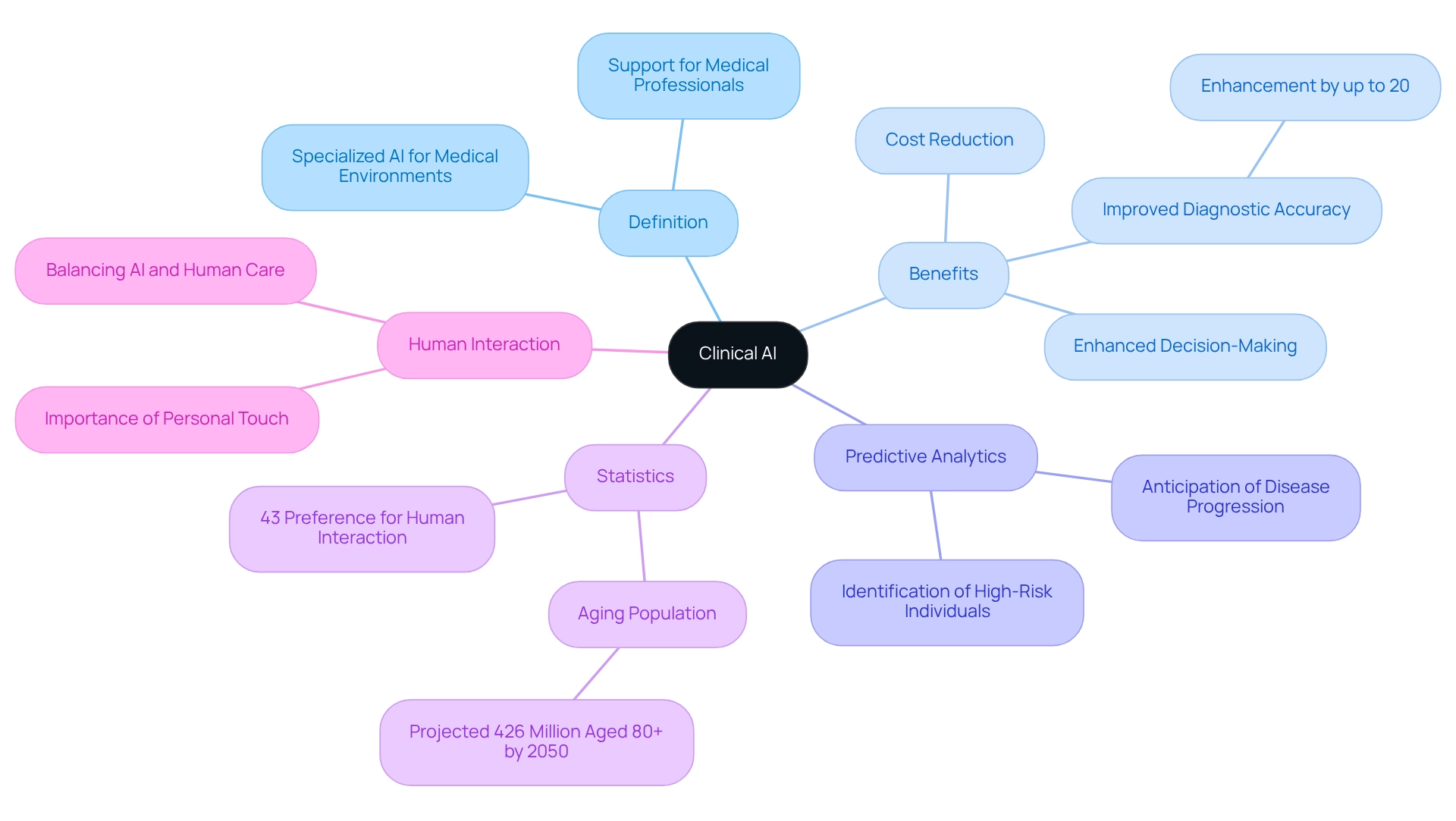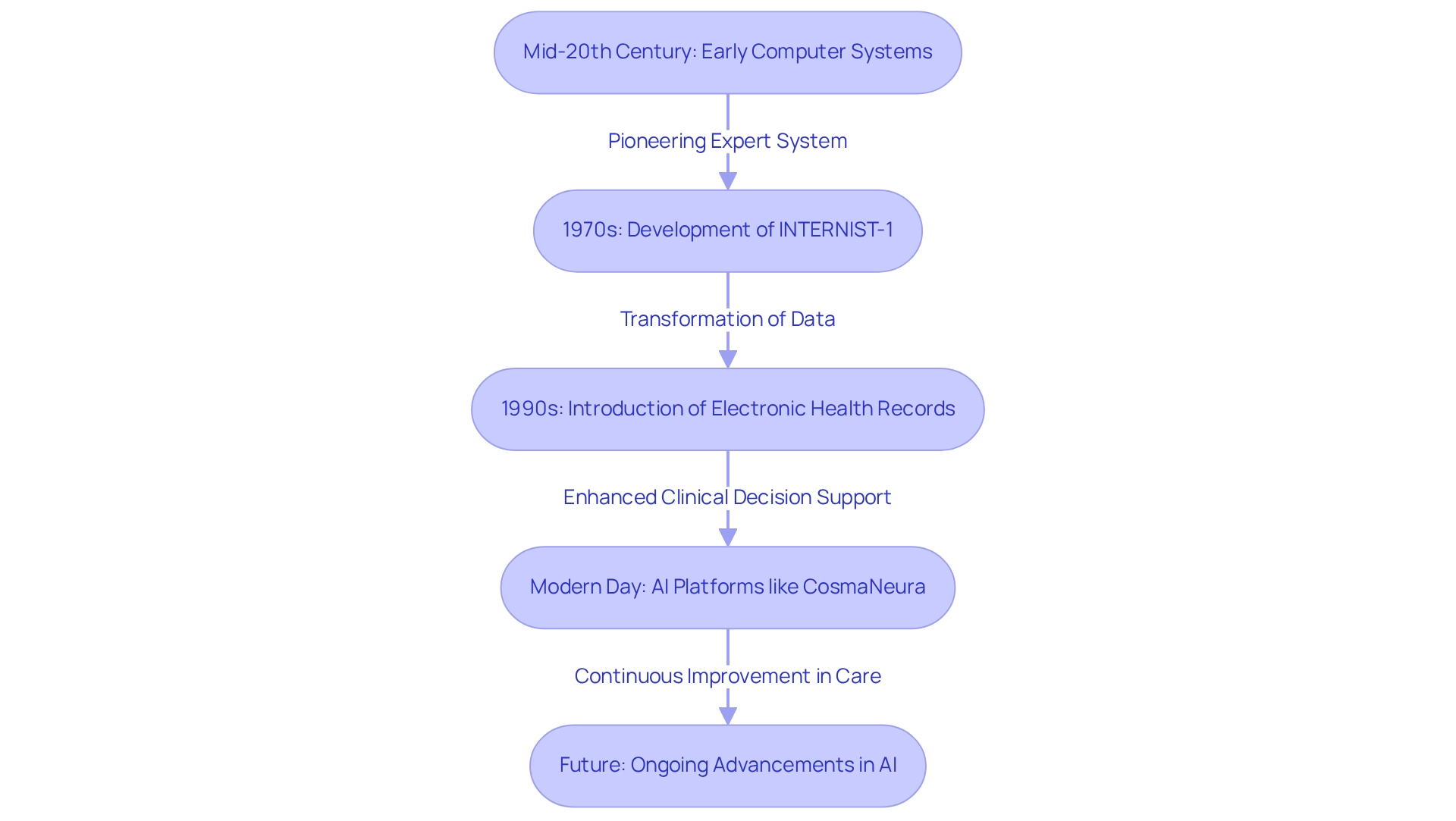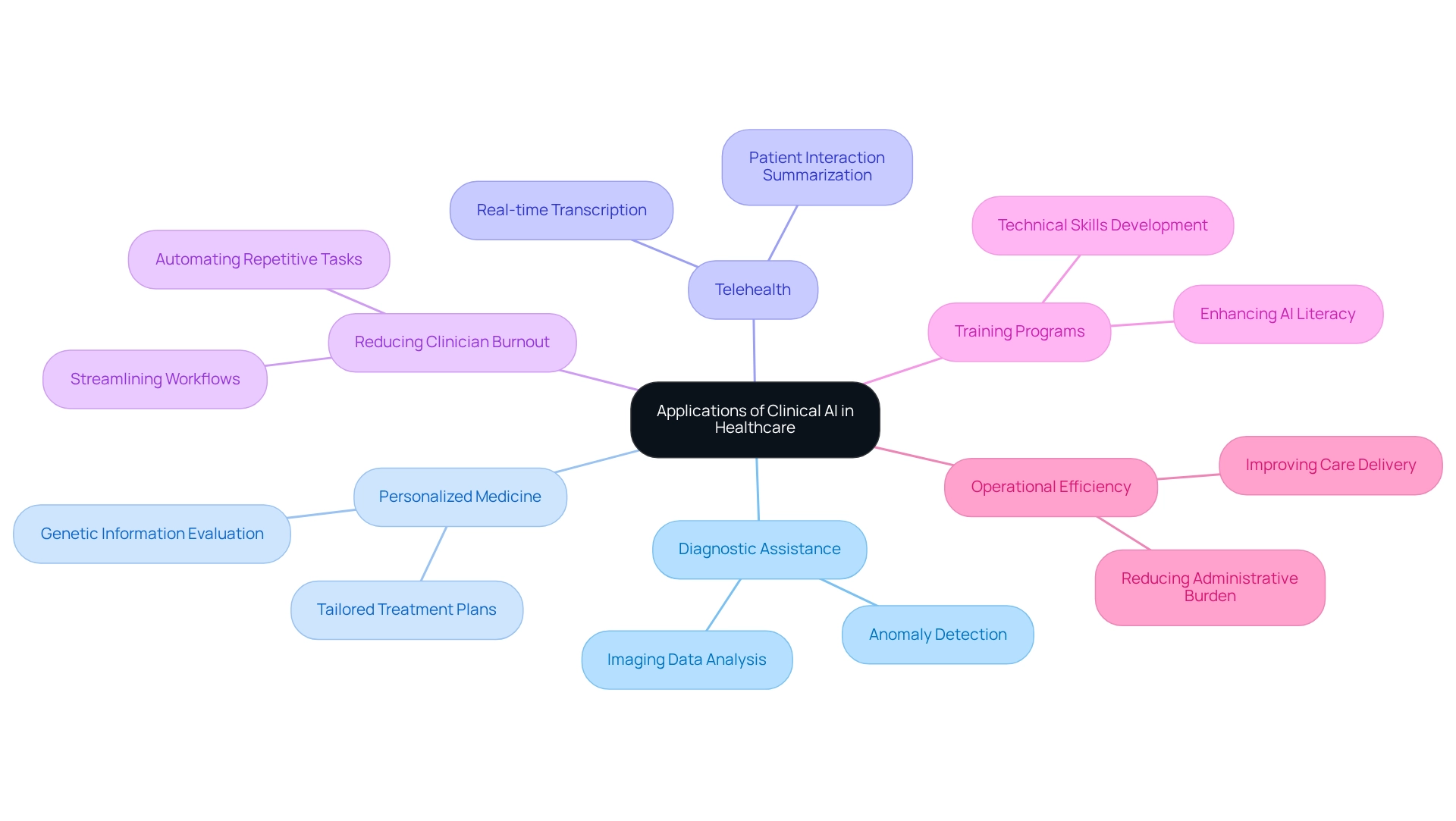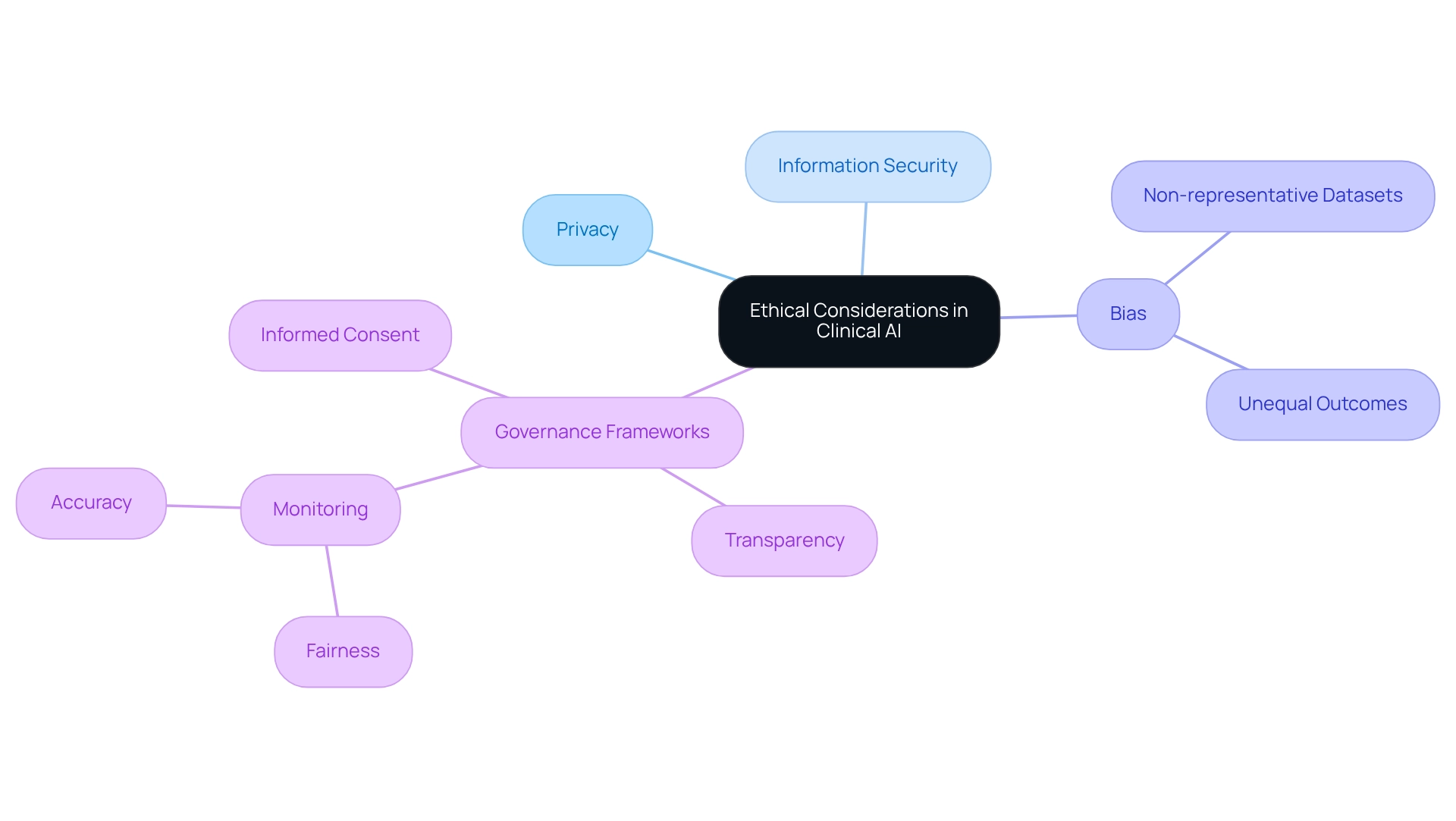Overview
This article delves into the definition, evolution, and applications of Clinical AI (clin AI), shedding light on its vital role in enhancing medical decision-making and improving patient outcomes. Have you ever considered how clin AI can alleviate some of the emotional burdens faced by healthcare providers? By boosting diagnostic accuracy and operational efficiency, clin AI not only supports healthcare professionals but also fosters a more compassionate approach to patient care.
However, as we embrace these advancements, it is crucial to acknowledge the ethical considerations that arise. Issues such as data privacy and algorithmic bias cannot be overlooked. How do we strike a balance between innovation and the compassionate care our patients deserve? This balance is essential in ensuring that technology serves humanity, rather than complicating it.
As we navigate this evolving landscape, let us reflect on the importance of integrating ethical practices into the development of clin AI. By doing so, we can create an environment where innovation enhances the quality of care while respecting the dignity and privacy of every individual. Together, we can champion a future where technology and empathy coexist harmoniously in healthcare.
Introduction
In the rapidly evolving landscape of healthcare, Clinical AI emerges as a transformative force, ready to revolutionize patient care and clinical decision-making. As healthcare providers face increasing demands and workforce shortages, it's essential to recognize the emotional toll these challenges can take. By harnessing advanced algorithms and predictive analytics, Clinical AI not only improves diagnostic accuracy but also streamlines workflows, ultimately enhancing patient outcomes. This integration offers a promising solution, paving the way for more efficient and compassionate care delivery.
However, the journey toward fully embracing this technology is not without its challenges. Ethical considerations surrounding data privacy and algorithmic bias must be addressed thoughtfully. It’s crucial to explore the multifaceted applications and implications of Clinical AI, revealing a complex interplay between innovation and the fundamental principles of patient-centered care. Together, we can navigate these challenges and foster a healthcare environment that prioritizes both technological advancement and the well-being of patients.
Defining Clinical AI: A Comprehensive Overview
Medical AI encompasses artificial intelligence technologies specifically designed to support professionals in medical environments. This specialized branch is dedicated to enhancing medical decision-making, improving diagnostic accuracy, and ultimately uplifting outcomes for individuals. Unlike , which may focus on administrative efficiencies or information management, specialized AI is crucial to care delivery. For example, advanced AI algorithms can analyze extensive individual data to suggest potential diagnoses or treatment pathways, streamlining clinical workflows and enriching the quality of care.
Recent statistics underscore the transformative potential of healthcare AI. Studies indicate that AI applications can enhance diagnostic accuracy by up to 20%, significantly impacting patient outcomes. As our aging population continues to grow—projected to reach 426 million people aged 80 or older by 2050—the demand for accurate and effective medical solutions becomes increasingly vital. Healthcare AI can play an essential role in meeting this need by improving the efficiency and effectiveness of healthcare delivery, ultimately alleviating pressures on healthcare systems and reducing costs associated with advanced treatments.
A key feature of clin ai is its predictive analytics capability, which enables the anticipation of disease progression and the identification of individuals at higher risk of developing certain conditions. By analyzing client data and patterns, AI algorithms can provide early alerts and facilitate preventive actions. This proactive approach not only leads to improved patient outcomes but also reduces costs related to advanced treatments, showcasing the role of clin ai in modern medical practice.
Ramesha Kamran, a content executive, notes that 'AI is poised to revolutionize medical services by enhancing disease diagnosis, treatment, prevention, and remote monitoring.' This sentiment is echoed in various case studies, including one that examines the impact of AI on medical workflows, demonstrating how AI has successfully improved diagnostic accuracy in clinical settings. These advancements empower medical professionals with actionable insights that foster informed decision-making.
As medical providers navigate the complexities of care, clin ai emerges as a vital tool, assisting them in delivering high-quality, compassionate support while addressing the pressing challenges of workforce shortages and increasing demands. It is also essential to recognize that while AI can enhance efficiency, the preference for human interaction remains significant; 43% of Americans value personal touch in healthcare settings. Balancing AI assistance with the need for human connection is crucial to ensuring that patient care remains both compassionate and effective.

The Evolution of Clinical AI: Historical Context and Technological Advancements
The evolution of healthcare AI has been a journey marked by significant milestones, beginning in the mid-20th century with early computer systems designed to assist in medical diagnosis. One notable achievement was the development of INTERNIST-1 in the 1970s, a pioneering expert system that aimed to diagnose complex medical conditions. This foundational system set the stage for the advancements we see in AI technology within healthcare today.
Over the years, the integration of machine learning, natural language processing, and information analytics has greatly enhanced the capabilities of healthcare AI. The introduction of electronic health records (EHRs) in the 1990s transformed the landscape, providing a wealth of information for AI systems to analyze. This evolution has led to the creation of more precise and effective clinical decision support tools, ultimately improving patient care, as clin ai is at the forefront of medical innovation, harnessing real-time data and predictive analytics to continuously enhance care and outcomes. A contemporary example of this progress is CosmaNeura, an innovative Agentic AI platform designed specifically for primary care providers who align with Christian values. By automating administrative tasks and improving clinical decision-making through AI, CosmaNeura empowers medical providers to enhance efficiency, increase revenue, and foster job satisfaction, all while upholding ethical standards in line with Catholic values.
As we look to the future, ongoing advancements in to further reshape the medical services landscape, making it more responsive and effective in addressing patient needs. Satya Nadella, CEO of Microsoft, underscores the importance of expanding AI capabilities in the medical field, reflecting the industry's commitment to leveraging technology for better outcomes. However, specialists predict a 10 to 20% likelihood of AI domination, raising important questions about the future implications of AI in healthcare.
As we navigate this evolving landscape, it becomes crucial to remain vigilant and ensure that AI advancements align with ethical standards and the core values of care. How can we, as healthcare providers, ensure that these technologies serve to enhance our ability to provide compassionate care? Let us embrace this journey together, ensuring that our commitment to ethical practices remains at the heart of our advancements.

Applications of Clinical AI in Healthcare: Enhancing Patient Care and Provider Efficiency
Healthcare AI encompasses a wide array of applications in medicine, significantly enhancing diagnostic assistance, treatment suggestions, and individual monitoring. Consider can analyze imaging data to identify anomalies, such as tumors or fractures, often achieving greater accuracy than human radiologists. In the realm of personalized medicine, clin ai is pivotal, evaluating a patient's medical history and genetic information to effectively tailor treatment plans. Telehealth platforms utilize clin ai for real-time transcription and summarization of patient interactions. This not only ensures meticulous documentation but also nurtures improved communication between providers and patients. Such capabilities are crucial in addressing clinician burnout. Ronald M. Razmi highlights that a substantial portion of this burnout stems from the extensive administrative duties placed on medical professionals. By alleviating these burdens through AI-driven innovations—like automating repetitive tasks and streamlining workflows—these solutions can enhance provider well-being and job satisfaction.
Furthermore, comprehensive training programs for medical staff are vital to bolster AI literacy and technical skills, enabling effective utilization of these tools in clinical practice. A case study on education and training for AI in medical services illustrates that such training empowers a workforce capable of leveraging AI to improve care for individuals and operational efficiency. The integration of Clin AI not only elevates the quality of care but also streamlines operations, significantly reducing the administrative burden on providers in the medical field. CosmaNeura, as the sole company developing AI solutions for the billion-dollar faith-focused medical sector, exemplifies this integration through its offerings, such as telehealth transcription and summarization. By addressing challenges like the fragmentation of medical systems and rising costs, clinicians can devote more time to care, ultimately leading to greater job satisfaction and better outcomes for those receiving treatment.

Ethical Considerations in Clinical AI: Balancing Innovation with Patient Care
The incorporation of clin ai into medical services brings forth significant ethical concerns, particularly around privacy, information security, and the potential for bias in AI algorithms. It's crucial to recognize that AI systems depend on extensive health data, making the protection of this information's confidentiality and security essential. Have you considered the risk that AI tools might unintentionally reinforce existing biases if they are trained on non-representative datasets? This can lead to unequal outcomes in medical care, which is a pressing concern for all of us in the healthcare community.
To address these challenges, medical organizations must establish robust governance frameworks that prioritize ethical standards and uphold patient rights. This involves:
- Obtaining informed consent for data usage
- Ensuring transparency in
- Continuously monitoring AI systems for fairness and accuracy
For instance, organizations like the Bradford District Care Foundation Trust have reported significant improvements in diagnostic timelines. This demonstrates the potential benefits of ethical AI use, which can enhance patient care and trust.
CosmaNeura's commitment to Catholic values aligns perfectly with these ethical guidelines, ensuring that AI recommendations and operations adhere to a compassionate framework. As the only company creating AI solutions for the billion-dollar faith-focused healthcare market, CosmaNeura emphasizes the importance of ethical practices in this niche. Balancing innovation with ethical considerations is essential to foster trust and ensure that Clin AI enhances patient care rather than undermining it. Public awareness regarding information security and the ethical use of Clin AI is vital for building trust and addressing concerns about privacy in AI technologies. As the healthcare landscape evolves, our commitment to ethical practices will be crucial in alleviating public fears about data privacy and the responsible use of AI technologies. Let us work together to ensure that technology serves to uplift and support our patients.

Conclusion
The integration of Clinical AI into healthcare presents a profound opportunity to transform patient care and enhance clinical decision-making. Are we ready to embrace this change? By improving diagnostic accuracy, streamlining workflows, and utilizing predictive analytics, Clinical AI meets the growing demands of our healthcare systems while prioritizing patient outcomes. As our healthcare landscape evolves, it is essential to adopt these technological advancements to alleviate workforce shortages and address the needs of an aging population.
Yet, the journey toward fully integrating Clinical AI is not without its challenges. How do we navigate the ethical considerations surrounding data privacy and algorithmic bias? The need for human connection in patient care must remain at the forefront. Establishing robust governance frameworks and prioritizing transparency in AI decision-making are crucial steps in building trust among healthcare providers and patients alike.
Ultimately, the successful deployment of Clinical AI relies on balancing innovation with ethical standards. This harmonious relationship can lead to a future where technology enhances the compassionate delivery of care, ensuring healthcare remains centered on the well-being of patients. As stakeholders in the healthcare ecosystem explore the multifaceted applications of Clinical AI, we must focus on creating a system that not only leverages technology but also upholds the foundational principles of patient-centered care.
Key Solutions:
- Foster transparency in AI decision-making.
- Establish governance frameworks to address ethical concerns.
- Prioritize human connection in patient care.
Together, let us embrace these advancements with a commitment to compassion and care, ensuring that our healthcare system evolves to meet the needs of every patient.




